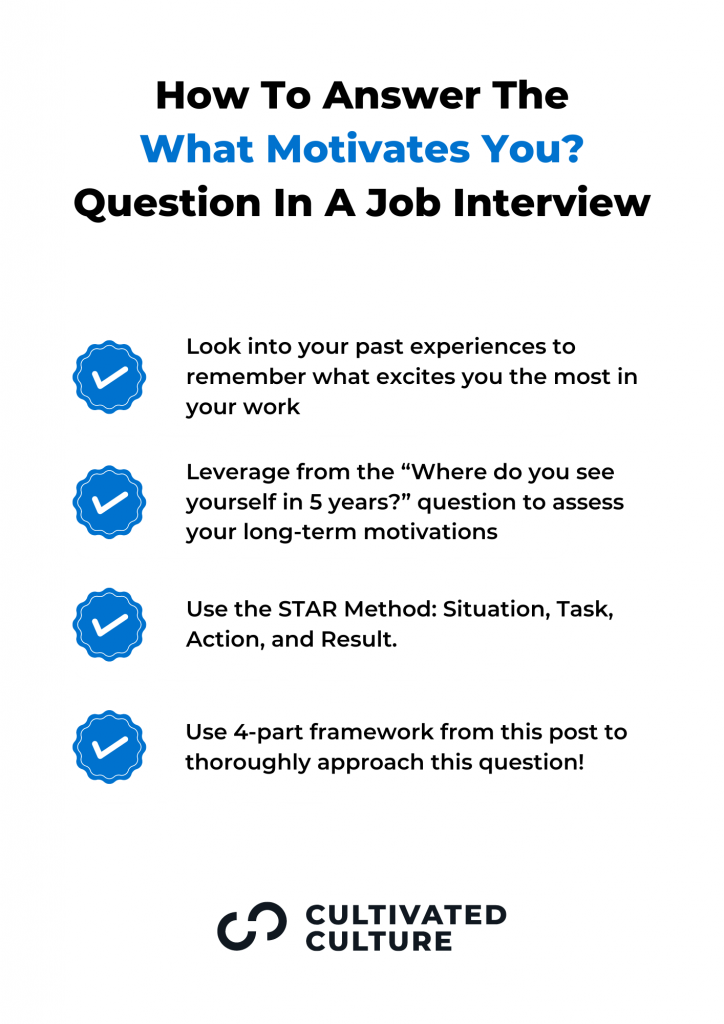When interviewers ask “What motivates you?” they are really trying to learn more about what drives and inspires you. This question can be challenging to answer, but it's a great opportunity to share your values and aspirations with the interviewer.
Your answer to this question should be honest and reflect what truly motivates you. To prepare for this question, think about what drives you at work and what motivates you to do your best. Some common motivators include challenging work that allows you to learn and grow, feeling appreciated by your colleagues, or making a difference in the lives of others.
What you share will give the interviewer a better understanding of what makes you tick and what kinds of work environments will be a good fit for you. So take some time to reflect on what motivates you, and prepare your answer in advance so that you feel confident going into the interview.
In this article, we'll cover everything you need to know to deliver a great answer to this common interview question like:
- Why Would An Interviewer Ask “What Motivates You?”
- How To Answer “What Drives You?” (And Other Similar Questions)
- What Answer Are They Really Looking For?
- The Best Way To Answer This Question
- What To Avoid Saying
- 3 Example Answers To The Question “What Motivates You?”
Why Does An Interviewer Ask “What Motivates You?”
The primary reason that interviewers ask this question is to gain a better understanding of what drives and inspires you. This is an important question for them to ask, as it can help them assess your fit for the role and the organization more broadly.
Many different factors can motivate people at work. Some examples include:
- Challenging assignments that allow you to learn and grow
- A positive and supportive team environment
- Feeling like you are making a difference in the lives of others
- A clear path for career growth and advancement
- Compensation and benefits that are competitive and fair
- Flexible hours or the ability to work from home
To effectively answer this question, it is important to be truthful and consider what truly motivates you. This means thinking about what drives you at work, what inspires you to do your best, and what kind of work environment will be a good fit for you.
How To Answer “What Drives You?” (And Other Similar Questions)
Sometimes, recruiters will ask this question with a different approach. Here are some examples of what you might hear during an interview:
- What drives you?
- What inspires you?
- What excites you about your work?
If you’re asked any of these questions, don’t worry! You can apply the same techniques to ace your interview. But before we get into that…
What Answer Are They Really Looking For?
When an interviewer asks “What motivates you?” they are looking for a thoughtful and detailed answer that gives them insight into what drives and inspires you at work, i.e., what motivates you to do a good job.
They want to understand what motivates you, what kind of work environment is suitable for you, and what type of duties or projects you'd be interested in.
Your answer to this question should be specific, using concrete examples when possible. For example, if you are motivated by a desire to help others, you could share a story about a time when you made a positive impact in someone's life.
The Best Way To Answer This Question
One of the best ways to answer this question is by using specific examples. This can help the interviewer get a better sense of what drives and inspires you at work, as well as what kind of role or environment would be a good fit.
To prepare for this question, it is important to reflect on what truly motivates you at work, what drives and inspires you to do your best, and what kind of work gives you energy.
Additionally, it can be helpful to think about what kinds of assignments or projects you find most engaging, as this can help you provide a more detailed and targeted response during the interview.
Ultimately, when it comes to answering this question, it is important to be honest and reflective of what truly motivates you at work. This can help the interviewer a better understanding of who you are and what kind of work environment you would excel in.
4 Tips To Crafting The Perfect Answer For The “What Motivates You?” Question
If you’re struggling to come up with the best answer, we’ve built a 4-step guide to help you craft a personal, inspiring, and unique answer. Here’s what you are going to do:
#1 Look into your past experiences
Remember when you nailed your first job and how excited you were with the prospects of your new life?
Or how thrilled you were when you ramped up an important project that drove positive results?
Re-embrace those feelings of excitement: they indicate what motivated you in the past and can provide valuable insight into what motivates you in the present and near future.
#2 Leverage the “Where do you see yourself in 5 years?” question
When recruiters ask this question, they are generally interested in assessing your aspirations and understanding how fit they are for the role you are interviewing for.
However, when you give enough thought to this question, you might realize you are, in a way, answering what motivates you.
Let’s say you are in marketing and your answer to this question goes something like this:
I’ve found a passion for marketing, particularly in the tech sector, and I feel like I would be a good fit for a leadership role. In five years, I see myself reaching a position as a Marketing Manager, where I will be able to execute high-level, 360º marketing strategies.
By looking into this answer, we can say that you are motivated by the opportunity to take ownership of projects that involve strategic thinking.
If you need to take a step back and give this answer a little bit more thought, be sure to check our article on how to answer the “Where do you see yourself in 5 years”!
#3 Use the STAR Method
The STAR method is used by job seekers like you to help them answer situational interview questions as such. The acronym stands for Situation, Task, Action, and Result.
Here’s how you can apply it to real-life situations:
Situation: share an anecdote about a time you faced a problem at work;
Task: provide details about what made the problem challenging;
Action: explain the steps you took to solve the problem;
Result: walk through the benefits resulting from your actions.
If you want more insight, check out our article on how to use the star interview method to impress your interviewer!
#4 Use this 4-part framework
There’s a technique you can use to ace this and every single question that pops up during your interview. It goes like this:
- Call out the goals of the company you are interviewing for
- Set the stakes for the example you will share
- Show your work and the steps you took to solve the problem
- Share the results you drove!
This post on LinkedIn breaks it down in detail, with examples:
Checklist: How To Answer the “What Motivates You” Question in Interviews
To recap, here’s a checklist for crafting the perfect “What motivates you?” answer:
What To Avoid Saying
Here are a few tips on what to avoid saying to an interviewer when asked “What motivates you?”
Providing an overly vague or generic response. It is important to be thoughtful and specific when responding and avoid giving answers that lack detail or do not provide much insight into what motivates you at work.
Giving answers that are not relevant to the job or company you are interviewing for. For example, if you are applying for a job as a teacher, it would be important to focus on what motivates you when working with students, rather than what motivates you in other aspects of your life.
Giving negative answers, or answers that could reflect poorly on you as a candidate. For example, avoid saying that you are motivated by money or power, as this could give the impression that you are not motivated by the work itself or by making a difference in the lives of others.
What Motivates You Example Answers
Below, we'll cover three sample answers to help give you some inspiration on what to say when asked “what motivates you?”
Example #1:
Desire to help others or make a positive impact in their lives
One of the reasons I'm so excited about this role is because it's perfectly aligned with the things that motivate me. I grew up in a rural part of Arizona where rising heat levels were always top of mind and it felt like we were lightyears behind in technology. We didn't get DSL until years after it went mainstream in other parts of the US! Those experiences instilled a desire for my work to create a positive impact in people's lives, with a specific focus on sustainability and access to technology.
As I've progressed through my career, I've made those priorities a core part of every role I decided to accept. One of the reasons I'm so thrilled about being considered for this role is how well Amazon and the product team align with this trajectory. Here are a few examples of each:
In my previous role at SparkSurge, I was part of a team that developed an eco-friendly packaging solution, reducing plastic waste by 30% for our entire product line. The Climate Pledge at Amazon is a direct tie to my desire for my work to help increase sustainability for people across the country and the globe.
Additionally, I've volunteered at multiple educational nonprofits focused on providing underprivileged students with access to technology and training over the past 7 years. Amazon's commitment to similar impact through the Amazon Future Engineer and AWS Educate programs are exciting to me, and I'm hoping I'm able to be a part of those even if it's only in an extracurricular capacity.
I'm honored to be considered for this role because I feel that Amazon's mission as a company and the initiatives it's focused on directly align with my core values and the impact I want to make on the world.
Example #2:
Desire to empower small buinsesses
What motivates me for this role is the intersection between innovation and problem-solving. My parents owned a small IT business, so when I began working as an office assistant back in 2009 at their company, I became very familiar with the challenges of companies on a budget looking to streamline their processes through cost-effective software solutions.
Moving forward in my career, I’ve always tried combining my set of skills with my desire to help small businesses. In my previous role as a Marketing Manager at SmartBiz, I leveraged content marketing strategies to promote a feature called Cash Flow Boost, designed to help SMBs manage their finances. This strategy has helped increase lead generation by 37% in the second half of 2023.
I feel like my motivation meets perfectly with Google’s commitment to empowering businesses. I am excited to join the Google Cloud Brand and Demand Generation team to help build brand awareness through content marketing and help businesses thrive!
Example #3:
Desire to face challanges
As a Senior Product Designer, my main motivation is addressing complex design challenges with a user-centric approach. When I was an undergrad student in Design, I volunteered to design a user-friendly interface for my school’s Student Portal – and received very positive feedback from fellow classmates!
Throughout my career, I’ve always felt driven to align my design skills with a dedication to enhancing user experience. In my previous role at StreamlineUX, for instance, I led a team of UX/UI designers in redesigning a budget-friendly e-learning platform, helping increase user retention by 15% in the second quarter of 2023.
I’m excited to join Netflix in its commitment to providing an unparalleled entertainment experience through cutting-edge technology. I’m positive that my experience in user-centric design will contribute to captivating and engaging audiences globally!
Example #4:
Desire to help people through technology
As a millennial, I've seen first-hand how technology can positively impact people's lives. I would say my main motivation is helping bridge gaps, connect communities, and clear the way for seamless digital experiences through technology.
In high school, I joined a small tech club and helped develop educational computer games to help middle-school teachers with in-class assignments. This experience led me to pursue a degree in Computer Science and, later, roll into a position as a Project Manager at Innovatech.
At InnovateTech, I've led the development of an AI-driven accessibility tool that has helped 50K+ users with visual impairments navigate the web.
I'm excited to join Meta and help build a digital environment that fosters meaningful connections and empowers individuals!
Final Thoughts
In conclusion, many different things can motivate people at work. It's important to be honest and reflective of what truly motivates you so that the interviewer can better understand what drives and inspires you, and if you're a good fit for the role you're interviewing for.
By focusing on what motivates you and articulating this clearly during the interview, you can set yourself up for success and give yourself the best chance of landing your ideal job. And as always, don't forget to send the interviewer a Post-Interview Thank You Email!




































